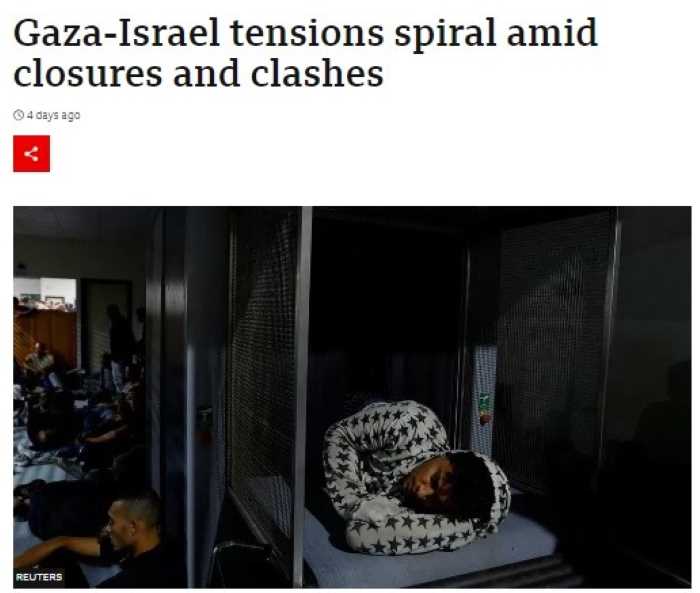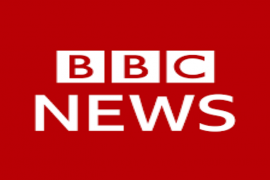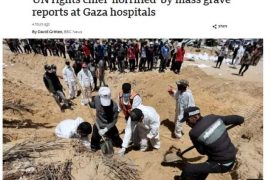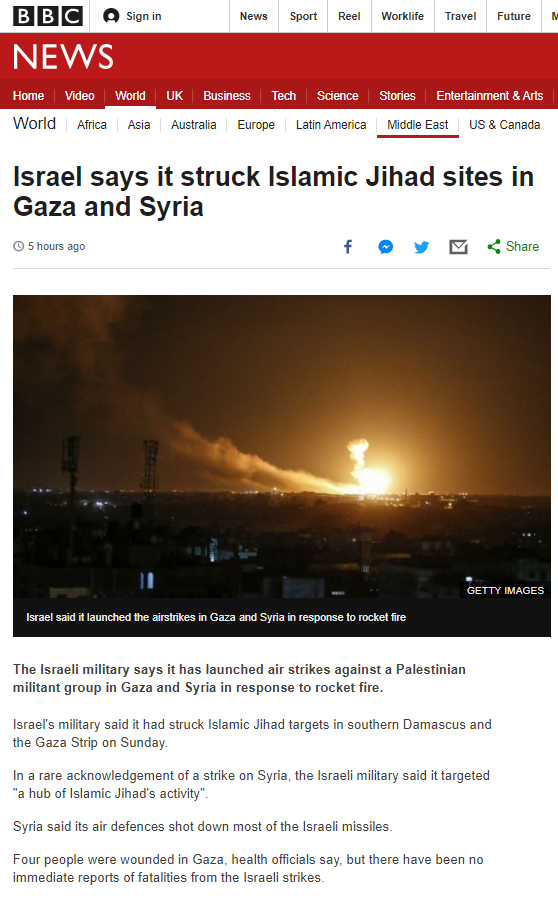Back in late August we noted the absence of any BBC reporting on the topic of rioting at the border between the Gaza Strip and Israel:
BBC NEWS SILENT ON PALESTINIAN INCITEMENT AND GAZA RIOTING
On September 14th the BBC News website portrayed one day of what it called “demonstrations” as being connected to the anniversary of Israel’s 2005 withdrawal from the Gaza Strip and the topic of incarcerated terrorists. As we noted at the time:
“Readers are not informed that similarly violent rioting along the border has already been taking place for several weeks. Neither do Knell and Abualouf bother to explain the connection between Hamas’ renewed efforts to spark “tensions” on the border, the demonstrations against Hamas which took place in the Gaza Strip in the previous weeks and the delays and cuts to cash donations from Qatar.”
Six days later the BBC Jerusalem bureau’s Yolande Knell reported the death of a Palestinian during similar rioting, telling BBC News website audiences that “Hamas […] has allowed the protests to restart as it tries to gain leverage in indirect talks with Israel brokered by Qatar” and that “Tensions have risen as a result of delays on Qatari aid which Israel allows into Gaza”.
At the time we noted that Hamas is responsible for the renewed rioting and that, contrary to the impression given by the BBC, the “delays” to Qatari aid are not directly connected to Israel.
On September 28th the BBC News website published another report by Yolande Knell and Rushdi Abualouf under the ‘cart before the horse’ headline ‘Gaza-Israel tensions spiral amid closures and clashes’. The closure of the Erez crossing in fact came as the result of the violent rioting rather than before it and in the report’s second paragraph it is clear that the BBC is aware of that, making that headline even more bizarre.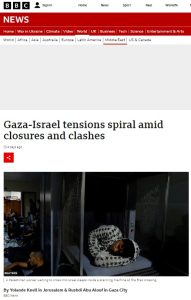
The report opens with a portrayal of residents of the Gaza Strip who work in Israel and a reference to one man’s “large debt to the middleman who had arranged his Israeli permit” without clarification of the fact that such ‘middlemen’ are usually connected to Hamas.
The context to the closure of the Erez crossing is portrayed as follows: [emphasis added]
“After a period of relative calm in Gaza, demonstrations restarted along its boundary fence earlier this month, with hundreds of young Palestinians turning out most days to confront Israeli soldiers. The rallies have been approved, even encouraged, by Hamas.”
Knell and Abualouf are clearly well aware of the fact that what they absurdly portray as “rallies” have included significant violence:
“Protesters have burnt tyres, thrown stones and explosive devices, and released incendiary balloons and kites into southern Israel, which have set fire to farmland and scared Israeli communities living nearby. Some have shot at soldiers, the Israeli military says. It has responded with tear gas and live fire.
One Palestinian at the fence was shot dead by Israeli forces and on another occasion, six were killed, apparently by a malfunctioning Palestinian explosive device.”
Nevertheless, they chose to qualify that violence both in the body of the report and a photo caption by means of superfluous punctuation:
“At one point earlier this week, the Israeli military responded to what it called the “violent riots” using a drone, helicopter, and tank to hit several targets in Gaza, including Hamas militant posts. There were no reports of any casualties.”
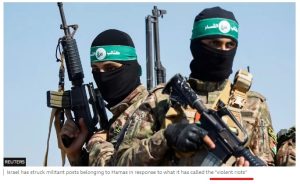
Readers are provided with the talking points of a proscribed terrorist organisation (from a source known to be unreliable) concerning the reason for the “demonstrations”:
“Hamas says that young Palestinians have organised events in response to the tough living conditions in Gaza, which has been under a tight Israeli-Egyptian blockade for the past 16 years, since the group took over the territory. It suggests they have also been motivated by Israeli actions in the occupied West Bank and East Jerusalem.
Hamas spokesman Hazem Qassem told the BBC that it was “a unified picture of a national struggle in all arenas”.”
With no explanation given concerning the terrorism that is the reason for the blockade, that messaging is supported by a contributor whose affiliation to the political NGO Al Shabaka is not clarified.
“For Omar Shaban, a political economist in Gaza, it is no surprise to see young people turning out by the perimeter fence.
“The situation in Gaza is boiling,” he says. “People who go to the border are frustrated by the lack of opportunity. Two thirds of Gazans are aged under 30, who don’t have jobs and they can’t travel and so they express their anger.””
Knell and Abualouf go on to reference the ‘Great Return March’ events, as they also did in their joint article published two weeks earlier. This time, however, they ‘remembered’ to clarify Hamas’ role in those events:
“However, for many Palestinians the demonstrations bring back painful memories of the Hamas orchestrated weekly mass protests between 2018 and 2019, known as the “Great March of Return”.”
Readers later find repromotion of a theme promoted by Knell in her September 20th article:
“With the renewal of the protests, albeit on a small-scale, there is a perception that Hamas has been trying to distract attention from its own economic woes but also to gain leverage in indirect talks with Israel, being led by Egypt, Qatar, and the UN.”
Only in paragraph twenty-one do readers find a brief reference to the cuts to Qatari aid which are the real context to this story:
“Just before the unrest by the fence restarted, Hamas announced that it was slashing the wages of its civil servants by half. Recently, Qatar, which helps pay the salaries under the terms of previous ceasefire understandings with Israel, has sent less money, for which Hamas blames Israel.”
As explained by Khaled Abu Toameh:
“Hamas is now sending Palestinians to get killed or injured on the border with Israel because it is apparently upset with its friends in Qatar, the Gulf state that has long been supporting the Muslim Brotherhood organization, of which Hamas is an off-shoot. Hamas is evidently taken aback because Qatar has reduced the monthly financial grant it has been providing to the Islamist movement in the Gaza Strip over the past five years.
Here is what is happening. An Arab country (Qatar) decides that it wants to channel fewer funds to a Palestinian terrorist group (Hamas). Hamas, instead of directing its grievances toward Qatar, responds by sending young Palestinian men to throw explosive devices, Molotov cocktails, and stones at Israeli soldiers along the border with the Gaza Strip. Apparently, Hamas is hoping that the “Zionist enemy” (Israel) will come to its rescue by putting pressure on Qatar not to cut the financial grant. With many of its leaders sitting in Doha, Hamas must be rather fearful about coming out in public against Qatar. […]
A Hamas security official in the Gaza Strip admitted that the attacks on Israeli soldiers along the border are due to differences between Hamas and Qatar regarding the Qatari grant. The official said that civil servants, including senior Hamas officials, have not received full salaries because of the reduction in the financial grant.”
On the topic of the reasons behind the Qatari decision to reduce aid to Hamas, Abu Toameh cites a report produced by BBC Arabic:
“Although Qatar has not offered any explanation regarding its decision to reduce the financial grant, a source close to Hamas told the BBC that the move was connected to the Qataris’ dissatisfaction Hamas’ recent effort to restore its relations with President Bashar Assad’s regime in Syria.”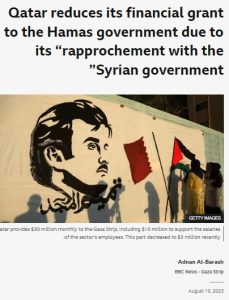
That report – ‘Qatar reduces its financial grant to the Hamas government due to its “rapprochement with the Syrian government”’ – appeared on the BBC Arabic website on August 10th. In other words, while one of Knell and Abualouf’s BBC Arabic colleagues was able to report on the reduction in Qatari aid to Hamas over a month and a half earlier, they nevertheless continue to promote to English speaking audiences the notion that the violent rioting at the border is perpetrated by “frustrated” youths and to portray it as a response to Israeli actions while at the same time promoting the Hamas talking point blaming Israel for the cuts to Qatari aid.
The question that arises is of course why the BBC’s Jerusalem bureau is not providing English-speaking audiences with the full range of information which would contribute to their understanding of Hamas’ deliberate violent provocations at the border and its disregard for the welfare of Palestinian workers unable to travel to their jobs in Israel and the lives of the young males it sends to riot.
Related Articles:

